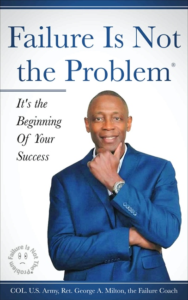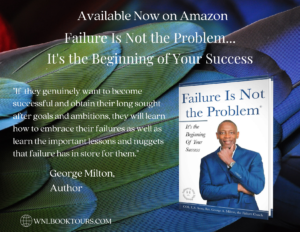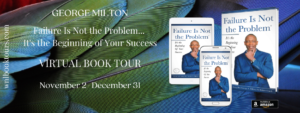Interview with CEO and Leadership Developer George Milton
 Inspirational speaker and master trainer George Milton is here today to share a little bit about his new motivational book, Failure Is Not the Problem, It’s the Beginning of Your Success.
Inspirational speaker and master trainer George Milton is here today to share a little bit about his new motivational book, Failure Is Not the Problem, It’s the Beginning of Your Success.
George’s visit is part of a two-month book tour with Write Now Literary.
Bio:
George Milton is the CEO of Failure Is Not The Problem, LLC, a consulting company that specializes in leadership development and training, life coaching, and motivational speaking. He is a United States Army Retired, Colonel who has over 30 years of experience as an internationally known Communicator, Coach, Mentor, Trainer Intuitive Counselor, Teacher, Inspirational Speaker, TV Co-Host and Author. George connects with people of all ages on all levels. He is a former University Assistant Professor who has extensive experience working with the federal government but also has a tremendous background in working within city government and community organizations. In his role as a Senior Staff Officer at European Command in Stuttgart, Germany he routinely briefed and spoke with Ambassadors. He has experience speaking to and training foreign government officials and delivering oration to foreign public entities. As the Division Chief of the Civil Partnership Division, at European Command, he led on an annual basis, a group of staff members to Oxford University, in Oxford, England on a two-week trip to study and learn how to properly” Partner” with civilian agencies in support of military organizations.
George Milton’s straight-from-the-heart, passion and high-energy, motivates audiences to step beyond their limitations and into their greatness in many ways. Over the past decade, George has used his role from keynote speaker to Master Trainer, creating the kind of workshop learning experience that got him committed to personal-and-professional development. His charisma, warmth and humor have transformed ordinary people into extraordinary achievers by using his own life, and his in-depth study of others’ challenges, to build an understanding of what works, what doesn’t work, and why.
He is a Certified Trainer in Success Principles, successfully completing the competency examination, and adoption of the Canfield Code of Ethics.
Welcome, George. Please tell us a little bit about your book.
Content of why I wrote Failure Is Not the Problem, It’s the Beginning of Your Success:
What would you do if you had a revolutionary resource to help you become a successful leader, reach your goals, make your life better and propel you to become all that you are meant to be?
Sounds impossible? Well, it is not! In the “impossible” is the “possible.” And if you want the possibility of becoming successful, United States Army Retired Colonel, George Milton’s book, Failure Is Not the Problem, It’s the Beginning of Your Success is a must read. Most leadership books major themes discuss how to achieve success only, but in life we all fail sometimes. And a lot of us fail miserably and oftentimes, more than we care to mention.
Throughout my life I have faced multiple failures over many years, yet I went on to achieve most of the goals I set for myself. It wasn’t always that way. In the beginning of my life failure hung over my head like an albatross around my neck. It wasn’t until I learned how to accept my failures and use those experiences to make myself better that I began to understand the value that my failure offered.
Too often we have been taught that failure has little or no value. We learn how to minimally tolerate our failure most times but not how to fully embrace our failures because of the negativity associated with that one powerful word.
I wrote my book, workbook, and journal in order to help those who are struggling with failure learn a better way of becoming successful. The topic is failure, but the goal for my readers is to learn how to become successful by utilizing their failures as their strength and not experience failure as a weakness as most have been taught.
If you want to succeed you must walk through the doorway of this life changing resource, failure. In my book I address the challenges of adversity and how failure can motivate you, focus you, and change your life for the better.
In my book I share my story of growth from a difficult youth to a distinguished career Army combat officer. I share that it was only possible because I changed and adjusted my attitude to understand that my failures were actually my greatest resource. Not only do I reveal personal triumphs and defeats, I demonstrate how in 12 easy to follow steps, you can transform your mindset from negative to positive regarding failure and in the process become successful.
Failure is a very difficult topic for most people to talk about and share. Therefore, not only did I write a book, but I also wrote a workbook and a journal to accompany my book so as to ease the challenge of approaching this sometimes-complex topic.
When I speak to people about their failures, I will sometimes present to the audience this one question, “when you fail, in one word, describe how that failure makes you feel.” Overwhelmingly there are two words that are at the forefront: disappointed and depressed.
The time has come for us to turn the page and reengage that one word, failure, and understand that once we learn how to accept our failures as a natural part of our lives, we will be able to not only achieve our life’s goals, but will be better equipped to live a more productive and happier life.
It is my hope that anyone who reads my book or finds the courage to go through the workbook and journal will understand that if they genuinely want to become successful and obtain their long sought-after goals and ambitions, they will learn how to embrace their failures as well as learn the important lessons and nuggets that failure has instore for them.
What inspired you to write this book?
Easy answer? Because I failed a lot and was depressed for a long time until I learned how to change my mindset to see failure as simply an experience. My failure throughout my life and career propelled me to my greatest successes because I learned how to understand and accept failure as my greatest resource.
What do you hope people take away from reading your book?
I hope that people will learn from my book that in order to become successful he or she will have to walk through the doorway of failure. I wrote my book, a workbook, and a journal to help alleviate those persons who suffer from negativity to change their mindset to accept failure as a positive outcome rather than the expected negativity which we are taught to assume when we fail. I want everyone to understand that failure can help them get from where they are to where they are meant to be.
Excerpt from Failure Is Not the Problem, It’s the Beginning of Your Success:
Why do people fear failure? Is it because failure represents a mark of disgrace associated with a specific unfavorable experience in our lives? Perhaps it defines the quality of person one might believe him or herself to be. Is it because failure signifies shame, disgrace, dishonor, disdain, or a blemish on our personhood? For me, it comes down to one word: stigma. It seems to me that if most people were honest, they could see how failure in and of itself isn’t necessarily the issue; it’s a stigma associated with the failure which creates the problems. Everyone basically knows that they have failed and will, at some point in the future, fail again. So, failure isn’t really the problem–it’s the stigma aligned with the failure, which attaches itself to our ego.
What’s your next writing project? Or what can we expect to see from you next?
I am beginning to write my next book; Failure Is Not The Problem, It’s Your Leadership. I am also working on starting up a book club and trying to get an licensing deal with Nike for my logo and phrase which are registered products.
When did you first consider yourself a writer?
In my early 20’S. When I was finishing up my first master’s degree, I was assigned to write a paper about Mary and Joseph in modern times. That sparked my interest, but I also wrote, at the time love letters to the woman I was in love with at the time which were very vivid. I could actually see what I was writing visually as I wrote.
Please share a little bit about your process for developing/organizing this/any book. (did you outline, hand write or type, do you use a software program, mindmap, etc.)
I come up with the ideas. Jot them down in an email. Forward to myself. And from there I elaborate on the stories and experiences.
What’s a bit of writing advice you wish you’d had before publishing your first book, that you now share with others?
It was my first book, so I needed to write it to learn what I didn’t know. Now I understand the importance of getting a really good editor. Marketing is critical.
What do you enjoy most about the writing process?
Being able to bring my story to life in the process of trying to help others who suffer from the negativity which failure brings into their lives. Changing that negativity to positivity on their way to becoming successful.
Anything additional you want to share with the readers? (anything not covered above that you’d like readers to know – personal, book-related, writing-related, anything you like)
If they have the idea to write a book……get to it.
Links:


